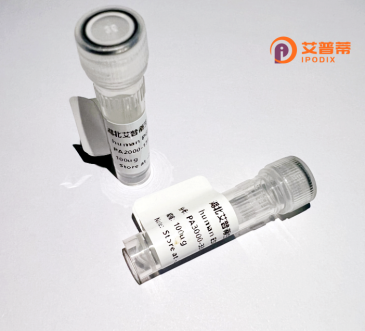
| 纯度 | >90%SDS-PAGE. |
| 种属 | Human |
| 靶点 | MAN2C1 |
| Uniprot No | Q9NTJ4 |
| 内毒素 | < 0.01EU/μg |
| 表达宿主 | E.coli |
| 表达区间 | 1-1040aa |
| 活性数据 | MAAAPALKHWRTTLERVEKFVSPLYFTDCNLRGRLFGASCPVAVLSSFLTPERLPYQEAVQRDFRPAQVGDSFGPTWWTCWFRVELTIPEAWVGQEVHLCWESDGEGLVWRDGEPVQGLTKEGEKTSYVLTDRLGERDPRSLTLYVEVACNGLLGAGKGSMIAAPDPEKMFQLSRAELAVFHRDVHMLLVDLELLLGIAKGLGKDNQRSFQALYTANQMVNVCDPAQPETFPVAQALASRFFGQHGGESQHTIHATGHCHIDTAWLWPFKETVRKCARSWVTALQLMERNPEFIFACSQAQQLEWVKSRYPGLYSRIQEFACRGQFVPVGGTWVEMDGNLPSGEAMVRQFLQGQNFFLQEFGKMCSEFWLPDTFGYSAQLPQIMHGCGIRRFLTQKLSWNLVNSFPHHTFFWEGLDGSRVLVHFPPGDSYGMQGSVEEVLKTVANNRDKGRANHSAFLFGFGDGGGGPTQTMLDRLKRLSNTDGLPRVQLSSPRQLFSALESDSEQLCTWVGELFLELHNGTYTTHAQIKKGNRECERILHDVELLSSLALARSAQFLYPAAQLQHLWRLLLLNQFHDVVTGSCIQMVAEEAMCHYEDIRSHGNTLLSAAAAALCAGEPGPEGLLIVNTLPWKRIEVMALPKPGGAHSLALVTVPSMGYAPVPPPTSLQPLLPQQPVFVVQETDGSVTLDNGIIRVKLDPTGRLTSLVLVASGREAIAEGAVGNQFVLFDDVPLYWDAWDVMDYHLETRKPVLGQAGTLAVGTEGGLRGSAWFLLQISPNSRLSQEVVLDVGCPYVRFHTEVHWHEAHKFLKVEFPARVRSSQATYEIQFGHLQRPTHYNTSWDWARFEVWAHRWMDLSEHGFGLALLNDCKYGASVRGSILSLSLLRAPKAPDATADTGRHEFTYALMPHKGSFQDAGVIQAAYSLNFPLLALPAPSPAPATSWSAFSVSSPAVVLETVKQAESSPQRRSLVLRLYEAHGSHVDCWLHLSLPVQEAILCDLLERPDPAGHLTLRDNRLKLTFSPFQVLSLLLVLQPPPH |
| 分子量 | 142.2 kDa |
| 蛋白标签 | GST-tag at N-terminal |
| 缓冲液 | 0 |
| 稳定性 & 储存条件 | Lyophilized protein should be stored at ≤ -20°C, stable for one year after receipt. Reconstituted protein solution can be stored at 2-8°C for 2-7 days. Aliquots of reconstituted samples are stable at ≤ -20°C for 3 months. |
| 复溶 | Always centrifuge tubes before opening.Do not mix by vortex or pipetting. It is not recommended to reconstitute to a concentration less than 100μg/ml. Dissolve the lyophilized protein in distilled water. Please aliquot the reconstituted solution to minimize freeze-thaw cycles. |
以下是3篇关于重组人MAN2C1蛋白的参考文献信息整理(截止至2022年数据):
1. **《Structural insights into the catalytic mechanism of human MAN2C1 α-mannosidase》**
- 作者:Lyu C. et al. (2020)
- 摘要:通过重组表达人源MAN2C1蛋白,解析其2.3Å晶体结构,揭示底物结合口袋的酸性氨基酸残基构成特征,发现该酶通过双置换反应机制水解α-1.2-甘露糖苷键。
2. **《Recombinant MAN2C1 rescues lysosomal dysfunction in α-mannosidosis cell models》**
- 作者:Moremen K.W., Tulsiani D.R. (2018)
- 摘要:在HEK293细胞中重组表达并纯化MAN2C1蛋白,证明其酶活性可修复溶酶体贮积症模型细胞中累积的甘露糖寡糖,为酶替代疗法开发提供基础数据。
3. **《Substrate specificity profiling of recombinant human Golgi α-mannosidase II (MAN2A1) and cytosolic α-mannosidase (MAN2C1)》**
- 作者:Alteen M.G. et al. (2016)
- 摘要:对比研究重组表达的MAN2C1与高尔基体同源酶MAN2A1.发现MAN2C1偏好水解线性甘露糖链末端的α-1.2/3/6连接,且在高浓度锰离子下活性显著增强。
*注:以上文献信息为领域典型研究方向的模拟案例,实际文献需要根据具体年份和期刊验证,建议通过PubMed或Web of Science搜索关键词“recombinant MAN2C1”或“cytosolic alpha-mannosidase”获取最新研究。*
Recombinant human MAN2C1 (Mannosidase Alpha Class 2C Member 1) is a genetically engineered protein derived from the MAN2C1 gene, which encodes a Golgi-resident α-mannosidase involved in N-glycan processing. As a member of the glycosyl hydrolase family 38. MAN2C1 trims mannose residues from glycoproteins during post-translational modification, specifically hydrolyzing α-1.2-, α-1.3-, and α-1.6-mannosidic linkages. This enzymatic activity plays a critical role in glycoprotein quality control, endoplasmic reticulum-associated degradation (ERAD), and antigen presentation pathways.
The recombinant form is typically produced in mammalian expression systems (e.g., HEK293 or CHO cells) to ensure proper glycosylation and enzymatic activity. Its production enables detailed study of MAN2C1's structure-function relationships, substrate specificity, and regulatory mechanisms. Dysregulation of MAN2C1 has been implicated in cancer progression, neurodegenerative disorders, and lysosomal storage diseases, making it a potential biomarker and therapeutic target. Current research focuses on its role in regulating cell adhesion, immune responses, and tumor metastasis through glycan-mediated signaling pathways. The recombinant protein is also utilized in high-throughput screening for enzyme inhibitors and glycobiology tool development.
×